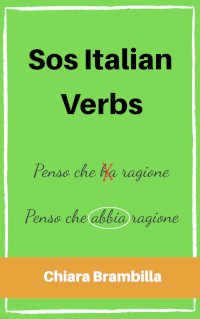
Having doubts about how to conjugate Italian verb forms in the right way is normal. Even native Italians sometimes have some.
Today I’m going to help you solve some of these doubts.
PIACERE
One of the major doubts about how to conjugate Italian verb forms you might have, could be related to one of the most common Italian verbs: piacere.
I bet that one of the senteces with the Italian verb piacere you use the most is related to food, such as: mi piace la pizza – I like pizza.
But what if you wanted to say that someone likes you?
In this case you need the simple present of the verb piacere. Can you conjugate it?
Here’s a hint: it’s not a regular verb in the present tense.
The conjugation is:
Io piaccio
Tu piaci
Lui/lei piace
Noi piacciamo
Voi piacete
Loro piacciono
So, the sentence Marco likes me can be translated as Io piaccio a Marco/A Marco piaccio io.
PREMERE
Another doubt you might have about Italian verb forms could be related to the passato remoto of the verb premere.
Let’s say you want to translate the following sentence into Italian:
They were told it was the only way to save themselves, so they pressed the button.
What is the correct form of the passato remoto of the verb premere?
If your answer was premettero, congratulations, it’s the right answer. If, instead, your answer was premerono, well, then…congratulations, it’s the right answer as well.
Indeed premere is one of those Italian verbs that can have two forms in the passato remoto.
Here’s the conjugation:
Io premei/premetti
Tu premesti
Lui/lei premè/premette
Noi prememmo
Voi premeste
Loro premerono/premettero
So, the complete English sentece: They were told it was the only way to save themselves, so they pressed the button can be translated as Gli era stato detto che sarebbe stato l’unico modo per salvarsi, quindi premettero/premerono il bottone.

Do you want to master all the Italian verb tenses? Have a look at my book Sos Italian verbs.
SAPERE
Let’s keep talking about passato remoto. Do you know the passato remoto of the verb sapere?
If your answer is “Of course, it’s io sappi, tu sapesti, lui sappe…” and so on, nice try, but it’s not quite the right answer.
Here’s the complete conjugation for you:
Io seppi
Tu sapesti
Lui/lei seppe
Noi sapemmo
Voi sapeste
Loro seppero
SUCCEDERE
Finally, let’s talk about the Italian verb succedere. One of the main doubts about how to conjugate Italian verb forms someone might have can be related to the past participle of this verb.
Indeed, in Italian the verb succedere has two possible forms in the past participle: successo and succeduto.
However, these two forms do not carry the same meaning.
For example, I can’t say è succeduta una cosa inaspettata – something unexpected happened – but I have to say è successa una cosa inaspettata.
So, when do we use successo and when succeduto?
Well, successo usually means happened while succeduto usually means succeeded.
Examples:
a. Cos’è successo qui? Chi ha versato tutta quest’acqua?
What happened here? Who spilled all this water?
b. Enrico VI è succeduto a re Enrico V
Henry VI succeded King Henry V
What are some of the doubts you have about how to conjugate Italian verb forms? Let me know in the comments below.
Credits
Original image by Alexas_Fotos




 Italian folklore characters – Il buffarello
Italian folklore characters – Il buffarello

